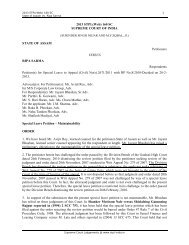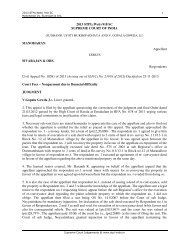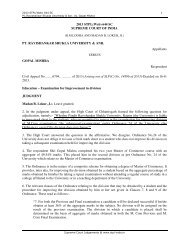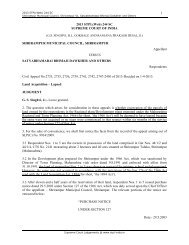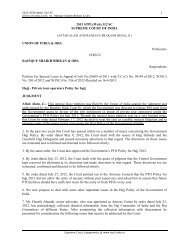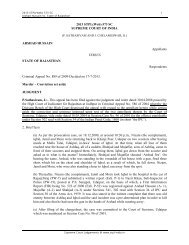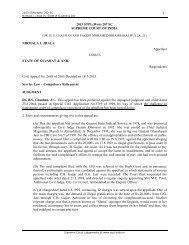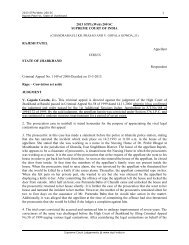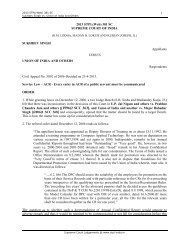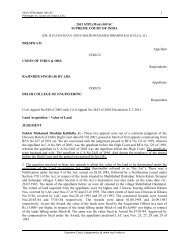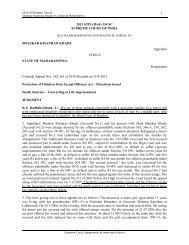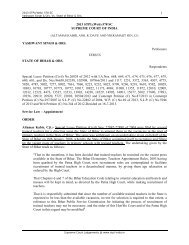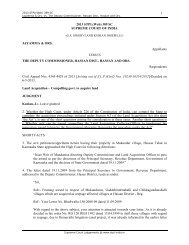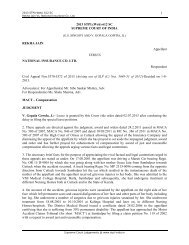Alaknanda Hydro Power Co. Ltd. Vs. Anuj Joshi & Ors. - STPL india
Alaknanda Hydro Power Co. Ltd. Vs. Anuj Joshi & Ors. - STPL india
Alaknanda Hydro Power Co. Ltd. Vs. Anuj Joshi & Ors. - STPL india
Create successful ePaper yourself
Turn your PDF publications into a flip-book with our unique Google optimized e-Paper software.
2013 <strong>STPL</strong>(Web) 626 SC 22<strong>Alaknanda</strong> <strong>Hydro</strong> <strong>Power</strong> <strong>Co</strong>. <strong>Ltd</strong>. <strong>Vs</strong>. <strong>Anuj</strong> <strong>Joshi</strong> & <strong>Ors</strong>.14. <strong>Co</strong>nclusionGovernment of Uttarakhand would get 12% free power from the project on itscommissioning.• The idea of construction of a 30km power channel in lieu of existing dam cannot beaccepted at this stage on account of (i) geological and geotechnical investigations notdone, (ii) enormous cost of the power channel and new diversion dam, (iii) issue of forestclearance and land acquisition, (iv) minimum 5 years of construction time, (v) very hightariff to be paid by the purchaser.• The Dhari Devi temple is not included in the protected monuments of ArchaelogicalSurvey of India and it is a local temple to be worshipped by nearby villagers only. All thelocal villagers and the priest of the temple are in agreement with the project authorities toraise the temple on RCC structure above HFL.• Option of providing a well surrounding the temple is neither practical nor acceptable tolocals.32. Final Report was submitted by B.K. Chaturvedi <strong>Co</strong>mmittee on April 2013 (Vol 1) before MoEF, interalia, reiterating its interim report on Dhari Devi Temple. Das <strong>Co</strong>mmittee, Chaturvedi and Joint Teamconstituted on the basis of direction of this <strong>Co</strong>urt have, therefore, fully endorsed the views made byINTACH on Dhari Devi Temple. We find no reason to differ from the views expressed by the expertcommittee, which was submitted hearing all the affected parties, including the Trustees of the Temple,devotees, Pujaris etc. <strong>Co</strong>mmittee reports to that extent stand accepted.33. We are also not impressed by the argument that by accepting the suggestions of all the expertcommittees to raise the temple as such to a higher place, would wound the religious feelings of thedevotes or violate the rights guaranteed under Article 25 of the <strong>Co</strong>nstitution. Sacred rock on which thetemple exits is still kept intact and only the height of the temple increased so that the temple would not besubmerged in the water. In Orissa Mining <strong>Co</strong>rporation v. MoEF, this <strong>Co</strong>urt was examining the rights ofSchedule Tribes and the Traditional Forest Dwellers under the Forest Rights Act, 2006 in the light ofArticles 25 and 26 of the <strong>Co</strong>nstitution. This <strong>Co</strong>urt held that those articles guarantee the right to practiceand proposals not only in matters of faith or beliefs, but all rituals and observation. We are of the viewthat none of the rights of the devotees of Dhari Devi Temple has been affected by raising the level of thetemple, which remains attached to the Sacred Rock.34. MoEF proceedings dated 30.06.2011, Report of the Das <strong>Co</strong>mmittee as well as the Joint Team dated3.5.2013 refer to the issue of muck management and disposal, catchment treatment area plan and greenbelt and also the safety of the Dam. Safety of the Dam35. Dam safety and security is a matter of paramount importance, failure of which can cause seriousenvironmental disaster and loss of human life and property. Proper surveillance, inspection, operation andmaintenance of dams is essential to ensure for safe functioning of the Dams. The Central Water<strong>Co</strong>mmission (CWC) is a premier technical organisation of India in the field of water resources. The<strong>Co</strong>mmission is also entrusted with the general responsibilities of initiating, coordinating and furthering, inconsultation with the State Governments concerned, schemes for control, conservation and utilisation ofwater resources throughout the country for the purpose of flood control, irrigation, drinking water supplyand water power development. Safety of dams, in our country, is the principal concern of the StateGovernment. The State Government has also to carry out investigation, planning, design, construction andoperation. AHPCL says, so far as SHEP is concerned, engineering and technical parameters of the damSupreme <strong>Co</strong>urt Judgements @ www.stpl-<strong>india</strong>.in



